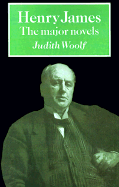Book contents
- Frontmatter
- Contents
- Acknowledgements
- A brief life of Henry James
- Bibliographical note
- 1 Introduction
- 2 The Europeans, Washington Square, Daisy Miller
- 3 The Portrait of a Lady
- 4 The Bostonians
- 5 What Maisie Knew
- 6 The Awkward Age, The Ambassadors
- 7 The Wings of the Dove
- 8 The Golden Bowl
- 9 Afterword
- Select bibliography
- Frontmatter
- Contents
- Acknowledgements
- A brief life of Henry James
- Bibliographical note
- 1 Introduction
- 2 The Europeans, Washington Square, Daisy Miller
- 3 The Portrait of a Lady
- 4 The Bostonians
- 5 What Maisie Knew
- 6 The Awkward Age, The Ambassadors
- 7 The Wings of the Dove
- 8 The Golden Bowl
- 9 Afterword
- Select bibliography
Summary
Difficulty can create its own difficulties. The initial stumbling-block with Henry James, for many of his readers, is not so much the fact that his novels are complex and oblique and idiosyncratic as a suspicious feeling that such complexity is wilful and unnecessary. This reaction is not, of course, by any means confined to James. Readers frequently approach writers as different from each other as John Donne from James Joyce with the same puzzled suspicion. In some of these difficult writers the difficulties, though necessary, are in a sense wilful, in that they are intended to divert or to delight, to exercise the author's ingenuity and the reader's wits, to astonish or even to tease, though they may have other and profoundly serious aims as well. To complain about this kind of difficulty is like complaining because a riddle is puzzling or because a firework is dazzling. Sterne's Tristram Shandy, Pope's Dunciad, Joyce's Ulysses are all examples of the kind of work I mean. However, there is another kind of difficulty, that of the mathematical expression which is difficult because it formulates precisely a difficult concept which could not otherwise be accurately expressed. To find fitting words for concepts of that order of difficulty but made shifting and changeful as well by all the myriad colourings of human life is a task that imposes its own constraints, all the more so if the truths to be expressed are of overwhelming importance to the writer.
- Type
- Chapter
- Information
- Henry JamesThe Major Novels, pp. 1 - 18Publisher: Cambridge University PressPrint publication year: 1991



